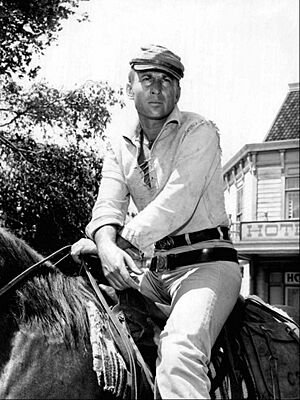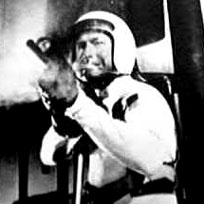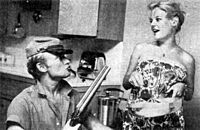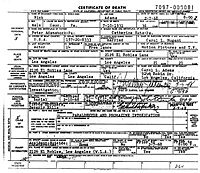Nick Adams (actor, born 1931) facts for kids
Quick facts for kids
Nick Adams
|
|
|---|---|
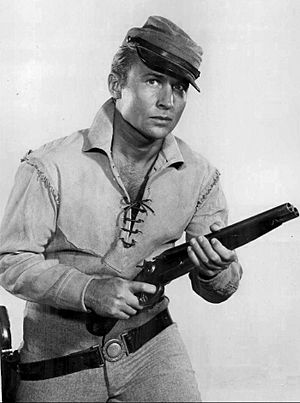
Adams promo for The Rebel (1959)
|
|
| Born |
Nicholas Aloysius Adamshock
July 10, 1931 Nanticoke, Pennsylvania, U.S.
|
| Died | February 7, 1968 (aged 36) |
| Occupation | Actor, screenwriter |
| Years active | 1952–1968 |
| Spouse(s) |
Carol Nugent
(m. 1959) |
| Children | 2 |
Nick Adams (born Nicholas Aloysius Adamshock; July 10, 1931 – February 7, 1968) was an American film and television actor and screenwriter. He was known for his roles in many Hollywood films during the 1950s and 1960s. These included Rebel Without a Cause and Giant. He also starred in the ABC television series The Rebel (1959–1961). Nick Adams also played leading roles in several Japanese movies, like Frankenstein Conquers the World and Invasion of Astro-Monster.
Contents
Early Life and Career Beginnings
Nick Adams was born Nicholas Aloysius Adamshock in Nanticoke, Pennsylvania. His parents, Catherine and Peter Adamshock, were from Ukraine. His father worked as a coal miner. Nick once shared that his family lived in "terrible" company houses and were always in debt.
Adams was a good athlete in high school. But he didn't get a part in the school play when he was a senior. His friends made fun of his dream to become an actor. Nick remembered, "Everybody thought I was crazy." His father wanted him to learn a trade, like being a barber. But Nick wanted to do something where he could earn a lot of money. After acting for a year without pay in New York, Adams traveled to Los Angeles.
Hollywood Acting Journey
Becoming an Actor
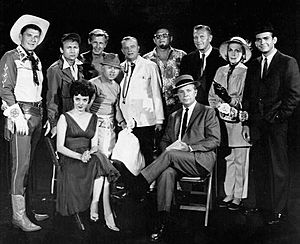
Nick Adams's first paid acting job in Los Angeles was a play called Mr. Big Shot. He earned about $60 a week. He also filled in for singer Pearl Bailey one night at the Mocambo nightclub, earning $25.
After three years of trying hard, he got his first film role in 1951. It was a small, uncredited part as a Western Union delivery boy in Somebody Loves Me (1952). This allowed him to join the Screen Actors Guild. But he still found it hard to get steady acting work. In January 1952, Adams joined the U.S. Coast Guard during the Korean War. He served until 1955 and earned two medals.
Supporting Roles in Films
In June 1954, while still in the Coast Guard, Nick Adams got a part in the film Mister Roberts. He played Seaman Reber. After his military service, he returned to Los Angeles. At 23, he got a powerful agent and signed with Warner Bros..
Adams had a small role as Chick in Rebel Without a Cause (1955). That same year, he played Bomber, the paper boy, in the popular film Picnic (1955). This movie starred William Holden and Kim Novak. Nick Adams wasn't seen as tall or handsome enough for main roles. But in the late 1950s, he had supporting roles in many successful TV shows and films. These included Wanted Dead or Alive (1958) with Steve McQueen, No Time for Sergeants (1958), and Pillow Talk (1959).
Friendship with James Dean
Nick Adams likely met James Dean in December 1950 while filming a soft drink commercial. Adams spent three years in the Coast Guard before filming Rebel Without a Cause in March 1955. After the movie was finished, James Dean said he considered Nick, Natalie Wood, and Sal Mineo his friends.
After Dean's death in a car accident in 1955, Adams helped by recording some of Dean's lines for the film Giant. Adams also dated co-star Natalie Wood. He tried to use Dean's fame to help his own career. He allowed himself to be photographed at Dean's grave. He also wrote articles and did interviews about Dean for fan magazines.
Friendship with Elvis Presley
Nick Adams's friendship with Elvis Presley started in 1956. They met on the set of Presley's film Love Me Tender. Elvis admired James Dean. When Elvis came to Hollywood, studio bosses wanted him to be seen with new young actors.
Nick Adams and Dennis Hopper were roommates during this time. The three of them often spent time together. Elvis enjoyed "hanging out more and more with Nick and his friends." Nick often met Elvis backstage or at Graceland. They would go motorcycle riding late at night. They would stay up for hours talking about being famous.
Elvis's girlfriend, June Juanico, said that Elvis always talked about Nick and James Dean. She also felt that Nick would invite himself to see Elvis. Nick would often talk about Natalie Wood to Elvis, describing her beauty. Elvis's mother even said, "He sure is a pushy little fellow."
Adams also wrote about his friendship with Presley. He published an account in May 1957. In August 1958, after Elvis's mother died, Elvis's manager wrote that "Nicky Adams came out to be with Elvis last Week which was so very kind of him to be there with his friend."
A book called "The Rebel and the King" by Nick Adams is a first-person story about his friendship with Presley. Nick wrote the manuscript in 1956. It was found 45 years later by Adams's daughter and published in 2012.
Starring in The Rebel
In 1959, Adams starred in the ABC series The Rebel. He played Johnny Yuma, a wandering, ex-Confederate soldier. Johnny Yuma kept a journal and carried a sawed-off shotgun. He was a "trouble-shooter" in the old American West. Adams is credited as a co-creator of The Rebel. He asked his friend Andrew J. Fenady to write the pilot episode for him to star in.
Adams reportedly asked John Wayne for advice on how to play the role. Adams wanted Elvis Presley to sing the theme song for The Rebel. But the show's producer wanted Johnny Cash. Famous guest stars on the show included Dan Blocker, Johnny Cash, and Leonard Nimoy. A total of 76 episodes were filmed before the series ended in 1961. Adams then went back to TV and film work. He also had a role in the TV series Saints and Sinners.
Academy Award Nomination
Adams was nominated for an Academy Award for Best Supporting Actor for his role in the film Twilight of Honor (1963). He played a murder suspect in the movie. This film was the first for both Linda Evans and Joey Heatherton. Adams spent money on ads to try and win the award. But he lost to Melvyn Douglas.
Later Career and Japanese Films
In 1964, Adams had a main role in an episode of The Outer Limits called "Fun and Games." At this time, Adams's career was slowing down. He hoped his role in Young Dillinger (1964) with Robert Conrad would be a big hit. But the movie wasn't well-made, and critics and audiences didn't like it.
In 1965, Adams started taking roles in Japanese science fiction monster movies (called kaiju eiga). He had major roles in two movies from Toho Studios in Chiyoda, Tokyo. His first Japanese movie was Frankenstein vs. Baragon. He played Dr. James Bowen, a radiologist in Hiroshima. Adams then starred in the sixth Godzilla film, Invasion of Astro-Monster (also known as Monster Zero). He played Astronaut Glenn, who travels to Planet X. In both films, his character had a romantic interest with actress Kumi Mizuno. Adams made three films in Japan between 1965 and 1966.
Adams's last film for Toho was "The Killing Bottle." In this movie, Adams performed his own fight scenes using Kenpo, a martial art he had been learning. Before this, he also co-starred with Boris Karloff in Die, Monster, Die! (1965), a horror movie filmed in England.
Final Films and TV Appearances
In early 1967, Disney released Mosby's Marauders. This was a Civil War drama where Adams played a Union army sergeant. Adams also guest-starred in five episodes of four TV series that year. These included an episode of his friend Robert Conrad's The Wild Wild West and two episodes of Hondo.
Throughout 1967 and early 1968, he worked in three low-budget films. One of these was Mission Mars (1968). Adams's costume for this movie included a regular motorcycle helmet. Adams's last U.S. movie was Fever Heat. His very last film was the Spanish-language western Los Asesinos, filmed in Mexico City.
Family Life
Nick Adams married former child actress Carol Nugent in 1959. Carol Nugent had appeared in an episode of The Rebel. They had two children, Allyson and Jeb Stuart Adams. Jeb became a child actor and is now a successful realtor. Allyson became a film director and is now a costume designer.
Nick Adams and actress Kumi Mizuno might have had a short relationship when he worked in Japan. His daughter, Allyson Lee Adams, later said, "My dad had a habit of falling for his leading ladies. It was a way for him to take on the role he was playing at the time." Rumors of a romance between them were common. But Mizuno denied it in an interview in 1996.
By July 1965, Adams and Nugent were legally separated. Nugent filed for divorce in September. The next month, while Adams was in Japan, Nugent was granted a divorce and custody of the children. In January 1966, Adams and Nugent announced they were getting back together. However, in November 1966, Nugent started the divorce process again. She said Adams was "prone to fits of temper." On January 20, 1967, Adams was granted temporary custody of the children. His son Jeb Adams later said, "He saw it as a competition, basically, more than anything of getting custody of us. But, a matter of a week or two later, he gave us back to my mom." Nugent later got full legal custody of the children.
Death
After finishing Los Asesinos (1968), Nick Adams flew to Rome, Italy. He was supposed to co-star in a movie called Murder in the Third Dimension. But when he arrived, he found the project had been canceled. Susan Strasberg, an actress who had worked with him, met a very sad Adams in a Rome bar.
On the night of February 7, 1968, his lawyer and friend, Ervin Roeder, went to Adams's house in Beverly Hills. Roeder went to check on him after Adams missed a dinner appointment. He saw a light on and Adams's car in the garage. Roeder broke through a window and found Adams dead in his upstairs bedroom.
Carol Adams is listed as Adams's spouse on his death certificate. This shows that the divorce was not final when he died. She and the children were living only a few blocks from his house.
Nick Adams was buried at Saints Cyril and Methodius Ukrainian Catholic Cemetery in Berwick, Pennsylvania. The back of his gravestone has a picture of Adams wearing the Civil War-era cap from his TV series. It says Nick Adams — The Rebel — Actor of Hollywood Screens.
Filmography
| Year | Title | Role | Notes |
|---|---|---|---|
| 1952 | Somebody Loves Me | Western Union boy | Uncredited |
| 1955 | Strange Lady in Town | Billy the Kid | |
| Mister Roberts | Reber | ||
| Rebel Without a Cause | Chick | ||
| Picnic | Bomber | ||
| I Died a Thousand Times | Bell Boy | Uncredited | |
| 1956 | Our Miss Brooks | Gary Nolan | |
| A Strange Adventure | Phil Davis | Alternative title: White Nightmare | |
| The Last Wagon | Ridge | ||
| Giant | Jett Rink | Voice, Uncredited | |
| 1957 | Fury at Showdown | Tracy Mitchell | |
| Sweet Smell of Success | Hot-Dog Stand Customer | Uncredited | |
| 1958 | Sing, Boy, Sing | C.K. Judd | |
| Teacher's Pet | Barney Kovac | ||
| No Time for Sergeants | Pvt. Benjamin B. Whitledge | ||
| 1959 | The FBI Story | John Gilbert "Jack" Graham | |
| Pillow Talk | Tony Walters | ||
| 1962 | Hell is for Heroes | Homer Janeczek | |
| The Interns | Dr. Sid Lackland | ||
| A Girl Named Tamiko | |||
| 1963 | The Hook | Pvt. V.R. Hackett | |
| Twilight of Honor | Ben Brown | Alternative title: The Charge is Murder Nominated for the Academy Award for Best Supporting Actor |
|
| 1964 | The Young Lovers | Tarragoo | |
| 1965 | Young Dillinger | John Dillinger | |
| Frankenstein vs. Baragon | Dr. James Bowen | ||
| Die, Monster, Die! | Stephen Reinhart | Alternative titles: Monster of Terror The House at the End of the World |
|
| Invasion of Astro-Monster | Astronaut Glenn | Alternative titles: Monster Zero Godzilla vs. Monster Zero |
|
| 1966 | Don't Worry, We'll Think of a Title | KEB agent | Uncredited |
| 1967 | The Killing Bottle | John Carter | Alternative titles: International Secret Police: Driven to the Wall Zettai zatsumi |
| Mosby's Marauders | Sgt. Gregg | ||
| 1968 | Fever Heat | Ace Jones | |
| Mission Mars | Nick Grant | ||
| Los Asesinos | Shannon | (final film role) |
| Year | Title | Role | Notes |
|---|---|---|---|
| 1956 | The People's Choice | Augie | Episode: "Sock and Augie" |
| 1957 | Playhouse 90 | Sandy | Episode: "The Troublemakers" |
| 1958 | Richard Diamond, Private Detective | Mickey Houseman | Episode: "Juvenile Jacket" |
| 1958 | Wanted Dead or Alive | Andy Martin | Episode: "The Martin Poster" |
| 1958 | Cimarron City | John Hartman, Jr. | Episode: "Twelve Guns" |
| 1958 | Letter to Loretta | Chip Davidson | Episode: "Out of Control" |
| 1958 | Steve Canyon | Sgt. Korman | Episode: "Operation Crash Landing" |
| 1958–1959 | Zane Grey Theatre | Lynn Parsons George Pelletti |
2 episodes |
| 1958–1959 | Trackdown | Various roles | 3 episodes |
| 1958–1961 | Wagon Train | Antonio "Tonio" Sam Upton |
2 episodes |
| 1959 | Yancy Derringer | Duke Alexis | Episode: "The Night the Russians Landed" |
| 1959 | Tales of Wells Fargo | Ira Watkins | Episode: "The Tired Gun" |
| 1959 | The David Niven Show | Episode: "Portrait" | |
| 1959–1961 | The Rebel | Johnny Yuma | 76 episodes Wrote 38 episodes, credited as creator |
| 1961–1962 | The Dick Powell Show | Nick Phillips George Townsend |
2 episodes |
| 1961–1962 | General Electric Theater | Paul Madsen Richard Martin |
2 episodes |
| 1962 | Checkmate | Weiler aka "Kid" | Episode: "A Chant of Silence" |
| 1962 | 'The Joey Bishop Show' | Singer Snooky Bradford | Episode: The Big Date |
| 1962–1963 | Saints and Sinners | Nick Alexander | 18 episodes |
| 1963 | 77 Sunset Strip | Max Dent | Episode: "By His Own Verdict" |
| 1963–1965 | Burke's Law | Various roles | 5 episodes |
| 1963–1967 | Combat! | Pvt. Mick Hellar Cpl. Marty Roberts |
2 episodes |
| 1964 | Arrest and Trial | Ronnie Blake | Episode: "A Roll of the Dice" |
| 1964 | The Outer Limits | Mike Benson | Episode: "Fun and Games" |
| 1964 | The Reporter | Roger | Episode: "How Much for a Prince?" |
| 1964 | Voyage to the Bottom of the Sea | Jason Kemp | Episode: "Turn Back the Clock" |
| 1964 | Rawhide | Corporal Dasovik | Episode: "Corporal Dasovik" |
| 1965 | Ben Casey | Orin Reid | Episode: "Three Li'l Lambs" |
| 1966–1968 | The Wild Wild West | Prince/Sheriff Dave Cord | Episode/S3 E18 |
| 1967 | The Wonderful World of Disney | Sergeant Gregg | 2 episodes |
| 1967 | The Monroes | Dave | Episode: "Gun Bound" |
| 1967 | Hondo | Apache Kid | 2 episodes |
See also
 In Spanish: Nick Adams para niños
In Spanish: Nick Adams para niños
 | Claudette Colvin |
 | Myrlie Evers-Williams |
 | Alberta Odell Jones |


